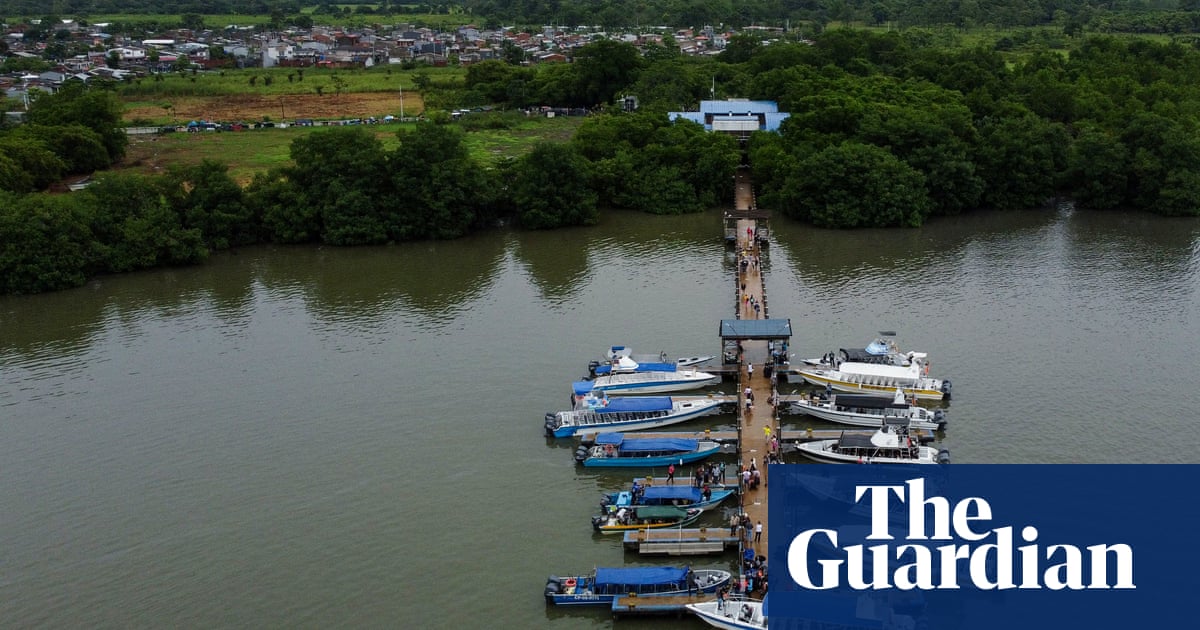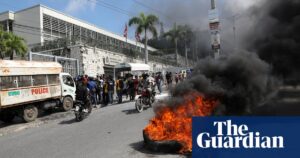
The flow of migration into the US via a dangerous and commonly used rainforest border passage has stopped due to the capture of two boat captains by the Colombian navy for transporting migrants.
However, efforts to prevent migration through the Darién Gap, the stretch of land between Colombia and Panama, have resulted in over 3,000 individuals being stuck in two isolated Caribbean towns. Officials are concerned that this bottleneck could lead to a potential public health crisis.
Johann Wachter, the government secretary, stated that in the town of Necoclí, typically a stop on the northern journey, around 1,000 individuals are currently queuing for boat rides to resume the usual ferry operation across the Gulf of Urabá.
“Necoclí is facing constraints in terms of its capacity,” Wachter stated. “We are attempting to find a resolution, as we are concerned that a large influx of individuals may negatively impact public stability.”
Wachter reported that two boat captains were detained by the Colombian coast guard for allegedly trafficking migrants. The authorities discovered that the captains were transporting approximately 150 passengers without the necessary documentation. As a result, the main boat companies in Necoclí temporarily stopped their operations and requested support from local officials to ensure that they would not face further repercussions.
It was uncertain if the detentions were individual occurrences or due to a government policy shift in Colombia. This country, like others in the area, has been facing increased pressure from the US to control immigration.
The contentious topic of migration will be a major focus in the upcoming 2020 US presidential election. On Thursday, both Joe Biden and his probable opponent, Donald Trump, made visits to the US-Mexico border in Texas.
The issue has grown significantly in the region, as evidenced by the sharp increase in the number of migrants crossing the Darién in recent years. In 2023, around 520,000 individuals made the journey, compared to just 24,000 in 2019. The majority of those who endure the difficult trek through the Darién are escaping countries in Latin America that are facing turmoil in areas of politics and economics, including Venezuela, Ecuador, and Haiti. However, there are also migrants originating from other faraway places such as Africa and China.
The Darién Gap is a region of wild forest that links Colombia and Panama. On the Colombian side, it is heavily guarded by organized crime groups, but those who cross into Panama are often victims of theft and sexual assault.
In December 2023, there were 214 instances of sexual violence reported in the Darién Gap, which is seven times higher than the monthly average reported between January and September of the previous year.
However, for numerous individuals who are escaping violence, discrimination, or financial struggles, trekking through the thick, mountainous rainforest remains the most viable path to the United States.
Although the route claimed the lives of approximately 50 migrants in the previous year, migration figures have continued to reach new highs during the pandemic, with 500,000 individuals making the journey through the Darién in 2023.
Migrants typically travel by boat from Necoclí or the nearby town of Turbo across the Gulf of Urabá in order to arrive at the base of the Darién Gap. From there, they pay around $350 to guides who help them make their way into Panama.
Unfortunately, due to a pause in boat transportation across the Gulf, approximately 3,500 individuals are now unable to continue their journey. As a result, at least 850 people are forced to sleep on the beach or streets, according to a statement from the United Nations Refugee Agency on Thursday.
Romely Pérez, age 26, is camping on Necoclí’s beach with her husband and three children, ages 8, 5, and 2. They had planned to stay for only a few days, but have now been there for over a week. The family, who are from Venezuela, are unable to use their savings, which they had borrowed and saved up for, to continue their journey through the Darién.
Occasionally, her kids are able to receive complimentary meals from a nearby non-profit organization. In return, she would do dishwashing duties at the rear area of a seaside eatery, receiving a plate of food to split with her spouse.
She expressed, “This is not living.” Her belief is that one must progress, not remain stagnant. It is terrible to be trapped in such a way.
Source: theguardian.com


















